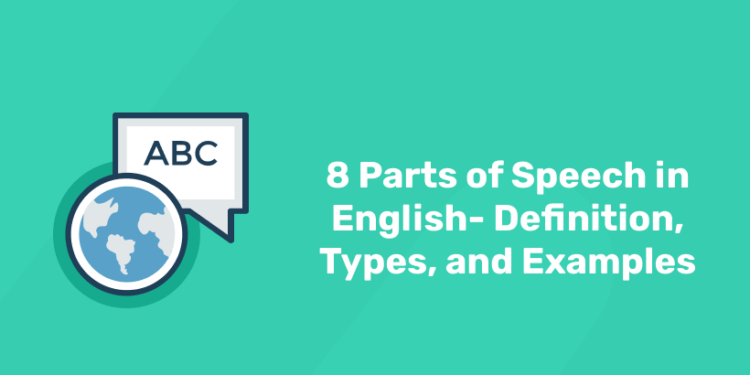Table of Contents
English language learning starts with parts of speech. It is an essential ingredient to improve your spoken English skills too. In English, there are eight parts of speech namely, noun, verb, pronoun, adverb, adjective, preposition, conjunction, and interjection.
Words can be classified in English according to their forms, meanings, positions, and functions. Each word in English is part of the speech. The significance of the word shows where it belongs in parts of speech. Knowing the parts of speech in English is essential for a new learner.
The English language can be tackled with the appropriate learning method. The comprehensive and systematic approach can help you to master the English language. Government exams are now giving more importance to basic grammar topics.
You should know the parts of speech to use in your communication. Language learning is incomplete without proper knowledge of parts of speech. If you want to improve your language skills, you need to learn from the basics. Are you ready to place your baby steps?
Used in different circumstances, the same word can act as more than one part of speech. The apt definition of a word can be tackled only with the help of parts of speech.
The different roles played by the word in a particular sentence are what we can term as parts of speech. Nouns, verbs, adjectives, and adverbs are the words belonging to form classes whereas Pronouns and Conjunctions belong to function class words.
Master pronunciation and fluency with our Spoken English classes.
Parts of Speech
- Words are classified into certain classes.
- Grammatical groups to place words
- Some words can perform the function of other parts of speech.
Eight Parts of Speech with Examples
1: Which of the sentences below is grammatically correct?
Noun
A noun is a word that denotes a person, place, thing, or idea. Nouns have gender, number, and case. Nouns can be classified into Concrete and Abstract nouns. Nouns that denote physical existence like names of places and things are called Concrete Nouns.
Examples
Paul, Laurel, Man, Building, River, Animal
- The buffalos were stung by bees
- The cruise ship takes control
- The thief hid himself
- The loud cry of the wolf was heard
- Tom bought a car
- The baron has a gold watch in his pocket
- He was accompanied by his sister
Join our Spoken English program today and communicate with ease!
Abstract nouns are nouns that are used to denote ideas, concepts, states of mind, processes, qualities, etc.
- Examples: equality,.truth, speech, joy, sadness, kindness, and faith.
There are four kinds of concrete nouns namely, common nouns, proper nouns, collective nouns, and material nouns.
Proper nouns denote the names of persons, places, nations, rivers, anime, etc. They are specific.
- Examples: Chennai, Mumbai, France, the Alps, Mars, Tom
Common Nouns: Common nouns refer to persons, and places belonging to particular classes. They are generic in nature.
- Examples: child, school, apple, bag, book, teacher, nurse
Collective nouns refer to groups of persons, of the same kind taken as one unit.
- Examples: army, team, government, audience
Material nouns: Material nouns refer to names of materials or substances out of which things are made.
- Examples: Gold, silk, glass, paper, rice, wood
Elevate your speaking skills with our Spoken English Course!
Pronoun
A pronoun is a word that is used instead of a noun. In English, there are nine kinds of pronouns. The different types of pronouns fall under each category based on their functions and meanings.
Personal Pronouns
Personal Pronouns have three forms namely, First person, second person, and third person.
Examples
- She has lost her pencil
- It is raining
- My friend says that they are going for a walk
Reflexive Pronoun is adding -self in the singular number and -selves in the plural number to pronouns such as your, my, him, her, and it.
Examples
- We did it ourselves
- He hurt himself
- She managed herself
Emphatic Pronouns
When the forms such as -self and -selves are used for giving emphasis, they are called as Emphatic Pronoun.
Examples
- The Prime Minister himself addressed the gathering
- I myself will call them
- The boy himself broke the chain
Interrogative pronouns
Those pronouns which are used for asking questions
Examples
- Who is your dance teacher?
- What do you know about her?
- Who is responsible for the job?
Distribute Pronouns
Those Pronouns are used for individual persons or things. Each, either and neither are called as distributive pronouns.
Examples
- Each of you will be punished
- Neither of them worked with me
- Either of them will secure first place
Reciprocal pronouns
Those Pronouns which show a mutual relationship. One another and each other are reciprocal pronouns.
Examples
- They like each other
- We help one another
- Two brothers fight each other
Indefinite Pronouns
Those are used in a general sense, without reference to particular things or persons
Examples
- Everyone was invited to the party
- Something went wrong
- One must be careful about matters related to family
Demonstrative Pronouns
Those are used to point out things or persons.
This, that, those, and these are relative pronouns.
- This house belongs to my uncle
- These books should be ready by tomorrow
- Those are my pets
Relative pronouns
The pronoun which refers to a noun that goes before it. It includes whose, whom, who, whereas, and which.
Examples
- This is the book which I want to receive
- These are stories that children will love to read
- This is the boy who secured the first prize.
Elevate your speaking skills with our Spoken English Course!
Adjectives
Adjectives qualify as nouns. They add to the meaning of a noun. It can also modify a noun. Adjectives can be used in comparative and superlative degrees. There are different kinds of adjectives.
- Adjectives of quality
- Proper Adjectives
- Participle Adjectives
- Possessive Adjectives
- Demonstrative Adjectives
- Adjective of Quantity
- Numerical Adjectives
- Distributive Adjectives
- Interrogative Adjectives
- Exclamatory Adjectives
- Epithet Adjectives
- Participial Adjectives
Examples
- The town is large
- John remained inactive
- The weather was pleasant
- Four strong women entered the room
- A cold wind began to blow
Adverbs
Adverb qualify verb. It adds more information about the manner of a certain action. It can not only modify a verb but also an adjective or another adverb. There are different types of adverbs.
- Adverb of time
- Adverb of place
- Adverb of manner
- Adverb of frequency
- Adverbs of degree
- Interrogative adverbs
- Relative adverbs
Examples
- He sought help very earnestly
- The old woman walks slowly
- He welcomed her warmly
Verbs
It is the most important word in a sentence. The verb is also regarded as a doing verb. It is also defined as an action word. The verbs assert actions. It can also explain the existence or occurrence of something. The verb can also convey ideas, images, mood, continuity, habit, condition, and sensuous qualities.
- Transitive verb: A transitive verb is a verb that takes an object.
Example: Ram arranges the files
- Intransitive Verb: An intransitive verb doesn’t require an object.
Example: Ram sits alone.
Examples
- She rang the bell
- They opened the window
- She plays violin
- He is watching TV
Conjunctions
Conjunctions are used to connect different parts of a phrase, clause, or sentence. It is usually denoting the relationship between the conjoined elements. The conjunctions can be coordinating or subordinating conjunctions. For, and, yet, but, nor, although because, not only… but also, or, so are common conjunctions in English.
Examples
- Minu and Jas are ready to join us
- Mithra did not go to school as she was hospitalized.
- Unless you work hard, you cannot secure rank.
Preposition
Prepositions are used to place before a noun or Pronoun. A pronoun is used to show the relation of a noun or pronoun to other words in a sentence.
Examples
- The pen is on the table
- We arrived at the station
- This is a story i have mentioned before
- They are people of principle
Interjection
Words that are used to express emotion come under the category of interjection. Interjections are used to convey strong emotions, feelings, excitement, etc. It is often accompanied by an exclamation mark.
Examples
- Wow! It’s a piece of art.
- Oops! I’m sorry
- Hurray! they won the trophy
Learn from the basics to speak like a native language speaker. It is not a difficult task. Entri English is offering a comprehensive outlook based on English Grammar. Learning English is the need of the hour. You can’t live a perfect life without having the slightest hint about how to use language like a good speaker. Modern English Grammar lessons can lessen your burden.
The resource materials provided by the Entri team can aid you to study in a comfortable environment. The lack of confidence is driving many enthusiastic job seekers to mere nothingness. Such situations can be averted if you could speak like a master. Knowing the language mechanism can help you to shine amid other speakers.
Entri English has introduced the best teaching methods to enlighten your language skills. The conversational lab, group discussion rooms, one-to-one interaction, etc can add quality to your preparation. Are you ready to find the best version of yourself? Learn, grow, glow and live with Entri English!
Join our Spoken English program today and communicate with ease!










